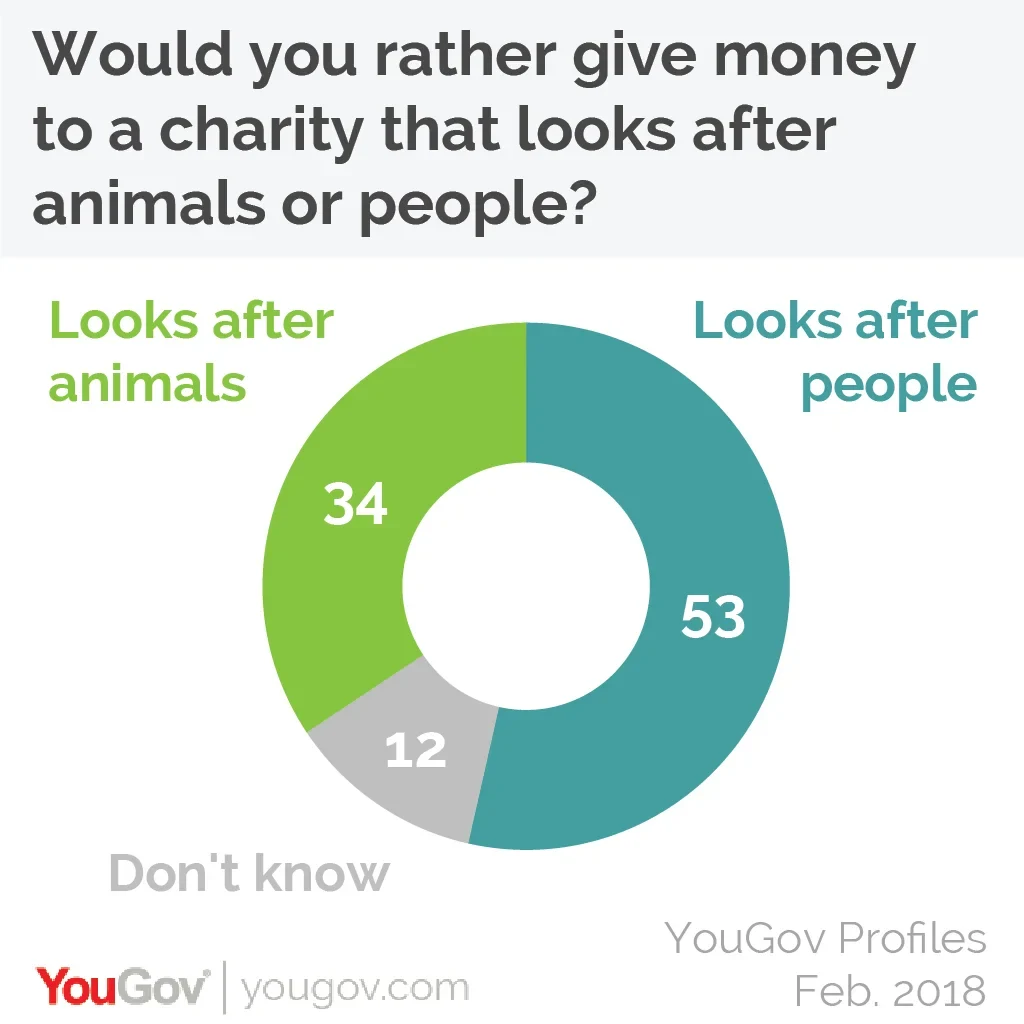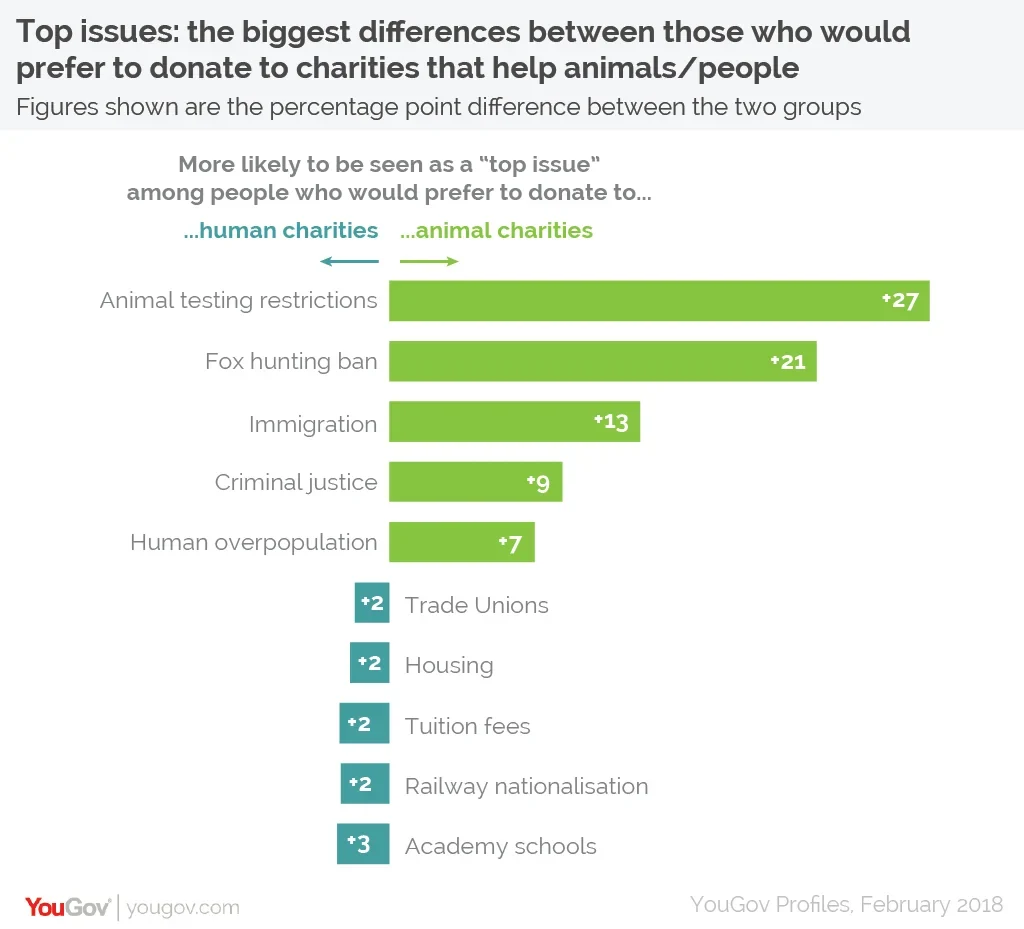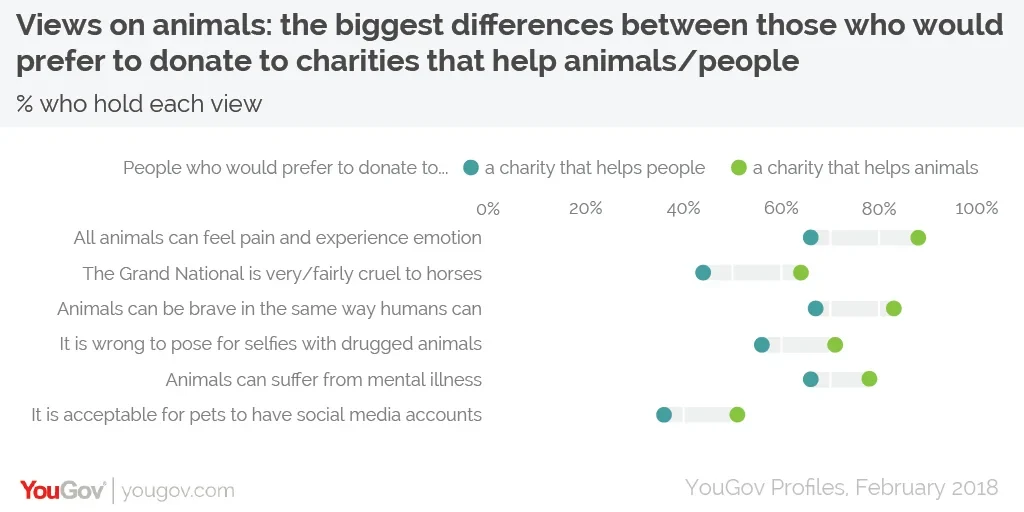YouGov Profiles provides a look at the characteristics of people on either side of the animal vs human charity divide
Over several weeks in December, YouGov asked almost 24,000 Britons whether, given the choice, they would prefer to donate money to a charity that looks after animals or one that looks after people. The data shows that the majority of Brits (53%) opt for the human charity, while a third (34%) prefer the animal charity and the remaining 12% can't decide.

What are the stand-out features of potential donors from each side of the debate? We used YouGov Profiles to compare the two groups and reveal what their key characteristics are.
Demographics and outlook
Those who would prefer to donate to animal causes are more likely to be female (54%), and specifically women between the age of 40 and 54 (17%, vs 11%). People who go for the human charity option are more likely to be male (55%), and specifically men over the age of 55 (15%, vs 10%).
There is a seven percentage point class divide – those that opt for charities that work with people are more likely to be middle class than their animal counterparts by 56% to 49%. Other noticeable demographic differences include that fact that those who would rather back animal charity are more likely to have no children (54% vs 41%), and those choosing human causes are more likely to be religious (55% vs 49%).
People that would support animal charities tend to hold more right wing views, being more likely to have voted UKIP at every election from 2010 onwards. Meanwhile those who would support human charities tend to be more left wing, being consistently more likely to have voted Labour or Lib Dem over the same time frame
There is a difference in what the two groups consider to be the "top issues" facing the country. Those preferring animal charities are more likely to pick animal testing and fox hunting, followed by immigration (which they tend to want to see much tighter restrictions on), criminal justice (which they tend to see as much too soft) and human overpopulation (which they tend to see as a big problem).

The "top issues" for those who would support human charities are academy schools (which they tend to think will make standards worse), tuition fees (which they tend to think should be paid by the government) and railway nationalisation (which, intriguingly, they are more strongly opposed to).
Attitudes towards animals and people
Unsurprisingly, it is attitudes towards animals that are the most likely to divide the two groups. Aside from the strength of feeling among the animal charity-backing group on animal testing and fox hunting that were detailed above, the biggest divisions are:
- In the animal sentience debate, those choosing animal charities are much more likely to believe that all animals can feel pain and experience emotion (88%, compared to 66% of those choosing human charities).
- Animal charity preferrers believe that the Grand National is very or fairly cruel to horses (64%, compared to 44% of those backing human causes).
- Those opting for animal charities more strongly believe that animals can be brave in the same way that humans can (83%, compared to 67% of people charity preferrers).
- Animal charity-backers believe that it is wrong to pose for selfies with large animals that have been drugged (71%, compared to 56% of those who prefer to donate to human causes).
- Those choosing animal charities are more likely to believe that animals can suffer from mental illness (78% vs 66%).
- People who would take the animal charity option believe it is acceptable for pets to have social media accounts (51%, compared to 36% of those choosing human charities).
Those opting for animal charities are far more likely to be pet owners than those preferring to back human charities (73% vs 42%). They are particularly more likely to own a dog (41% vs 19%) or a cat (37% vs 20%).
By contrast, people charity-backers are noticeably more likely than their animal-preferring counterparts to have warmer views of friends and family. They are more likely to say that their friendship group is a really important part of their life (67% vs 58%), and that spending time with family is one of the most joyful things in their life (57% vs 50%). They are also slightly more likely to agree with the statement "family over everything" at 66% vs 61%.
Charitable activity
One in five of those who said they would back an animal charity over a human one (23%) have donated to an animal cause in the past three months (compared to 5% of those who made the opposite choice), and are also slightly more likely to have donated to an environmental or conservation cause (8% vs 4%). By contrast, those who preferred the human charity option are more likely to have made donations to causes involving: children and young people (16% vs 8%), health and medicine (19% vs 12%) and poverty relief/international development (9% vs 4%).
Those choosing animal charities are more likely not to have donated money to a charity at all recently (62% vs 57%), with financial reasons being the most common reason: 27% of those animal charity preferrers who had not donated recently say they can’t afford give to charity (compared to 22% of people charity preferrers who had not donated recently).
This is hardly surprising given that those with a preference for animal charities are more likely to be at the lower end of the income scale than those who prefer people-helping charities, and are twice as likely to say they have no disposable income at the end of each month (10% vs 5%).
Photo: Getty








